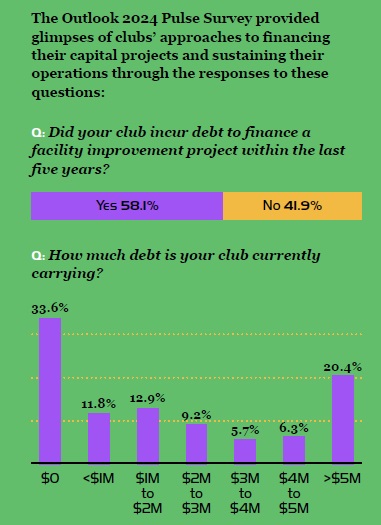In the realm of private clubs, the importance of robust financial leadership cannot be overstated. As clubs navigate a rapidly evolving landscape and ramp up their capital expenditures, as described in other articles in this issue, it is crucial to redefine their financial leadership needs that will affect decisions regarding debt, assessments and other factors.

Here are some of considerations that drive this reassessment trend:
- Who is on the Board? Demographics, affluence and private club education among board members all influence the perceived need for financial expertise on staff. While some clubs may be able to boast of a board replete with accomplished finance experts, it’s essential to distinguish between volunteer leadership and operational financial leadership. Relying solely on well-intentioned volunteers to manage finances may leave a club vulnerable when unforeseen financial challenges arise. While there may be well-intended financial executives volunteering to collectively handle the big stuff, what happens when unforeseen circumstances arrive and the club has not invested in having the needed skills and leadership in the financial operations? This certainly does not align well with proven best practices in governance and management.
- Risk Mitigation. Clubs have faced unprecedented challenges in recent years, from pandemics to natural disasters. To respond to these as they arise, clubs must be equipped with leaders who are capable of proactively planning for various scenarios and leading the charge when necessary. Relying solely on reactionary measures after a disaster strikes is neither prudent nor sustainable. Having effective financial leaders in place can help clubs mitigate risks by making data-driven decisions, implementing forecasts and developing strategies for resilience and recovery. Backpedaling after a disaster is not the solution; having the right financial leadership already in place is.
- Overall Collaboration and Education. A modern finance leader is more than just a numbers expert. Today’s clubs should seek individuals with hospitality DNA who possess financial acumen, strong presentation skills, executive presence and a commitment to mentoring and teaching. These leaders can bridge the gap between financial operations and other areas of club management by collaborating with department heads, educating staff, and cultivating an inclusive organizational culture. They also serve as trusted advisors to the general manager, the finance committee and the board.
While these considerations represent just a fraction of the factors impacting the reassessment of financial leadership in clubs, they underscore the importance of initiating these crucial conversations. Understanding the unique financial leadership needs of each club is paramount to ensuring financial stability and future preparedness. By embracing change and investing in the right financial leadership, clubs can pave the way for long-term success and resilience in an ever-evolving landscape.


